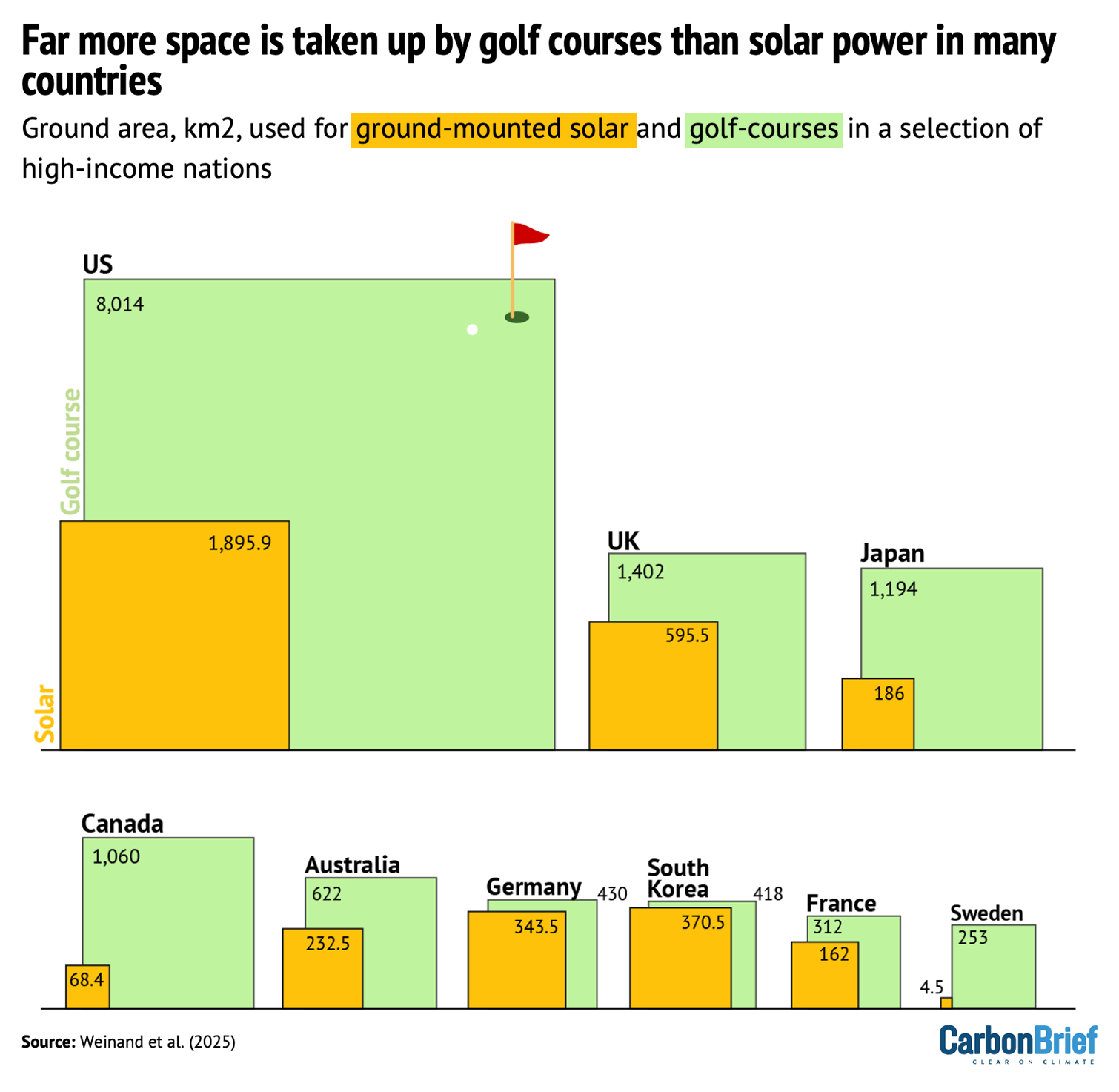
DeBriefed 29 August 2025: Record wildfires; Solar myths factchecked; Climate veteran on COP reform
Multiple Authors
08.29.25Multiple Authors
29.08.2025 | 12:27pmWelcome to Carbon Brief’s DeBriefed.
An essential guide to the week’s key developments relating to climate change.
This week
Broken records
FIRES: Wildfires have burned through more than 1m hectares of land across the EU, making 2025 the worst year on record, the Guardian reported. Blazes in the EU have burned four times as much land this year as the average over the past two decades, according to data from the European Forest Fire Information System, the outlet said. Meanwhile, the UK has “almost certainly” faced its hottest summer on record, according to provisional Met Office data covered by BBC News.
FLOODS: At least 34 people have been killed as heavy rainfall across India and Pakistan continued to cause flash floods and landslides in Indian-controlled Kashmir, the Associated Press reported. Continuing extreme rainfall in China has caused more than $2bn in damages since July, noted Reuters. Typhoon Kajiki has killed at least eight people in Vietnam and Thailand, with more flash floods and mudslides expected, Channel News Asia reported.
Turbine turbulence
POWER SHOCK: Shares in the Danish wind-power developer Ørsted dropped to a record low after the Trump administration ordered the firm to stop work on a near-complete project, the Financial Times reported. The $1.5bn Revolution Wind project is four-fifths complete and was due to power 350,000 homes in Rhode Island and Connecticut, the newspaper said.
‘WINDFARM WASTE’: In the UK, the energy regulator Ofgem announced that energy bills will rise by 2% for millions of households in October, with the Times reporting that part of the increase is due to the rising cost of “paying wind farms to switch themselves off”. The news sparked a wave of critical editorials and comment pieces in right-leaning and climate-sceptic UK newspapers. A Carbon Brief factcheck previously explained how gas prices, rather than “balancing costs” associated with wind farms, are the largest driver of high electricity prices in the UK.
Around the world
- FORESTS FOREVER: At a summit in Colombia, Brazil won the backing of other Amazon nations for its $125bn “Tropical Forests Forever Facility”, a fund first launched at COP28 in 2023, Bloomberg reported.
- CHINA CAP: China’s cabinet announced that the country will “tighten its carbon trading market by introducing absolute emissions caps in some industries for the first time starting by 2027”, Reuters said.
- RECORD RENEWABLES: Global renewables investment increased by 10% in the first half of the year, when compared to last year, to a record $386bn, according to new data from BloombergNEF covered by BusinessGreen.
- BANKING BREAK: The Net-Zero Banking Alliance has “paused” its activities “after losing top European and Wall Street members amid Trump’s ongoing crusade against climate change”, reported the Financial Times.
- STAFF SUSPENDED: The US Federal Emergency Management Agency (Fema) has suspended more than 20 members of staff who signed an open letter warning that Trump’s cuts to the body could risk a “national catastrophe” on the scale of Hurricane Katrina, according to BBC News.
87%
The percentage of new coal-power capacity located in China or India that came online globally in the first half of 2025, as revealed in a guest post for Carbon Brief written by Global Energy Monitor researchers.
Latest climate research
- Exposure to heatwaves may cause people to age faster | Nature Climate Change
- The number of supercell thunderstorms – the “most hazardous thunderstorm category” – could increase by an average of 11% in Europe under 3C of global warming | Science Advances
- Sea level rise projections from the Intergovernmental Panel on Climate Change (IPCC) second assessment in 1995 were “strikingly close to what transpired over the next 30 years” | Earth’s Future
(For more, see Carbon Brief’s in-depth daily summaries of the top climate news stories on Tuesday, Wednesday, Thursday and Friday.)
Captured

Carbon Brief published an in-depth factcheck debunking 16 of the most commonly heard false and misleading myths about solar power. One such claim is that solar power poses “a serious threat to agriculture and food security” by taking up land. The chart above, adapted from the factcheck, puts such a claim in perspective using the land-use of golf courses as a comparison.
Spotlight
How to reform the UN’s climate COPs
This week, Carbon Brief highlights a short extract from a new autobiography written by the late Peter Betts, who was the UK and EU lead negotiator at various COPs, including 2015’s pivotal COP21 in Paris. Betts, who died of brain cancer in October 2023, used his book to lay out his views on how to reform COPs – a topic Carbon Brief recently asked a range of experts about, too.
Of course, the UNFCCC and COP process has its shortcomings. For example, I would be the first to acknowledge that progress on finance, adaptation and loss and damage has been too slow. But I would argue that it would not have happened at all without the central global discussion afforded by the COPs, at which vulnerable countries always have a strong voice.
The alternative to COPs – often put forward by big and powerful countries – is to do everything within the G20, perhaps complemented by plurilateral cooperation between big states. No one would be more pleased to see the end of the COP process than big oil and gas interests in the US who sought to undermine COPs throughout my decade or more in negotiations.
My experience was that excluding the vulnerable countries led to lower-ambition outcomes which the US and emerging economies were comfortable with. The vast bulk of vulnerable countries would be horrified to lose the COPs, since it guarantees them a voice.
Overall, then, I believe that the case for keeping a global forum, where all have a seat at the table and, therefore, the most vulnerable have a voice, is overwhelming, and this is the UNFCCC. It is an indispensable political moment every year to rally the forces of ambition for climate change (and, to paraphrase Voltaire, if we didn’t have it, we would need to invent it). There are, however, two improvements that could be made to the way COPs operate.
1: The second stocktake
Formal stocktakes occur every five years, at a point two years before the next five-yearly ambition cycles of the COPs (such as Paris and Glasgow). But there is almost no focus by the media or NGOs on the announcements of NDCs [nationally determined contributions], especially those of “developing countries”, despite the importance of NDCs’ impact on climate goals.
In the run-up to the five-yearly stocktakes there should be a moment, perhaps a third of the way through the year, where we can see where we stand, individually and collectively, following the NDCs that have been announced. If some countries’ proposals are weak, those countries should be pressured to do more; if some have not submitted a proposal at all, then that should be highlighted.
It seems unlikely that the big economies would agree a formal process change, as when I have suggested such a second stocktake “moment” to various partners they have expressed concerns that it would be controversial. However, civil society should look to create this moment outside the formal process with analysis and media-friendly events which would provide an opportunity to assess (and put pressure on) relative, proposed contributions.

2: Annex membership
Second, we should review membership of the annexes to the convention, which set out who is “developed” and who is a “developing” country. We need a step change in support for emerging economies to help them make the transition to low carbon, which is increasingly affordable and will bring them other benefits. This means much more finance from Annex II countries, complemented by finance from China (the world’s biggest sovereign investor) and from Gulf states, who have grown rich on selling fossil fuels.
Sadly, however, I doubt whether it will be possible to negotiate changes to membership of the annexes, even though that was required by the convention to happen by 1998. But could countries such as China and the Gulf states not voluntarily step into Annex I and/or even Annex II?
Non-Annex I countries now constitute nearly two-thirds of global emissions and are likely to be a far higher proportion of emissions growth. So, if we want to limit climate change, it is these emissions we need above all to target. Of course, we must complement this by quicker action by Annex I countries, perhaps alongside negative emissions, and we must provide much more serious help to some non-Annex I countries.
Adapted from The Climate Diplomat: A Personal History of the COP Conferences by Peter Betts, published by Profile on 28 August and available now.
Watch, read, listen
KATRINA: Twenty years on from the category-five hurricane that devastated New Orleans, the Times had a lengthy feature about the “flood, failures and chilling aftermath”. Netflix also released a three-part series about the disaster.
SLOP: DeSmog investigated the websites using AI-generated content citing non-existent climate experts and institutions.
FAILED MODEL: Pakistani journalist Arifa Noor lamented in Dawn the “development model” being adopted by the nation’s “ruling elite” amid the “rage of climate change”.
Coming up
- 31 August-5 September: Africa Food Systems Summit, Dakar, Senegal
- 1 September: Guyana elections
- 3 September: Jamaica general election
- 5-10 September: Africa Climate Summit 2, Addis Ababa, Ethiopia
Pick of the jobs
- World Weather Attribution, media relations manager | Salary: £46,614-£56,345. Location: London/hybrid
- Wood Mackenzie, research analyst – solar supply chain, power & renewables | Salary: Unknown. Location: Shanghai
- Conservation Law Foundation, vice president for clean energy and climate change | Salary: $136,000-$175,000. Location: Boston, US
- London School of Economics, head of Climate and Growth Initiative | Salary: £53,949-£62,160. Location: London
DeBriefed is edited by Daisy Dunne. Please send any tips or feedback to [email protected].
This is an online version of Carbon Brief’s weekly DeBriefed email newsletter. Subscribe for free here.



